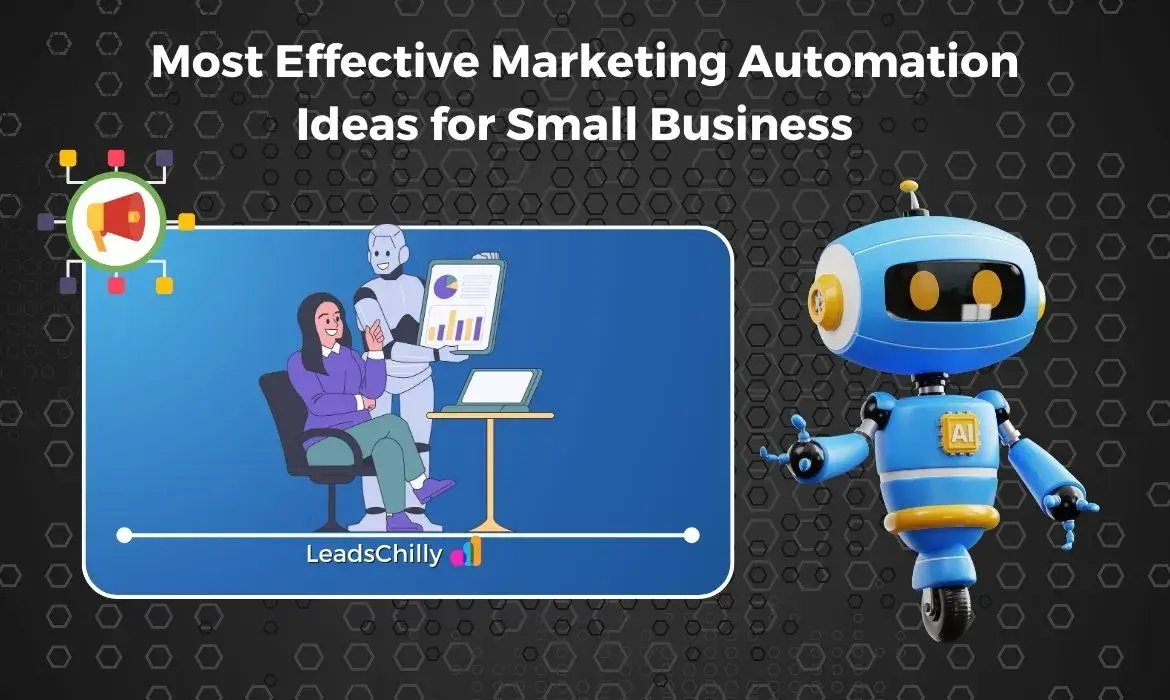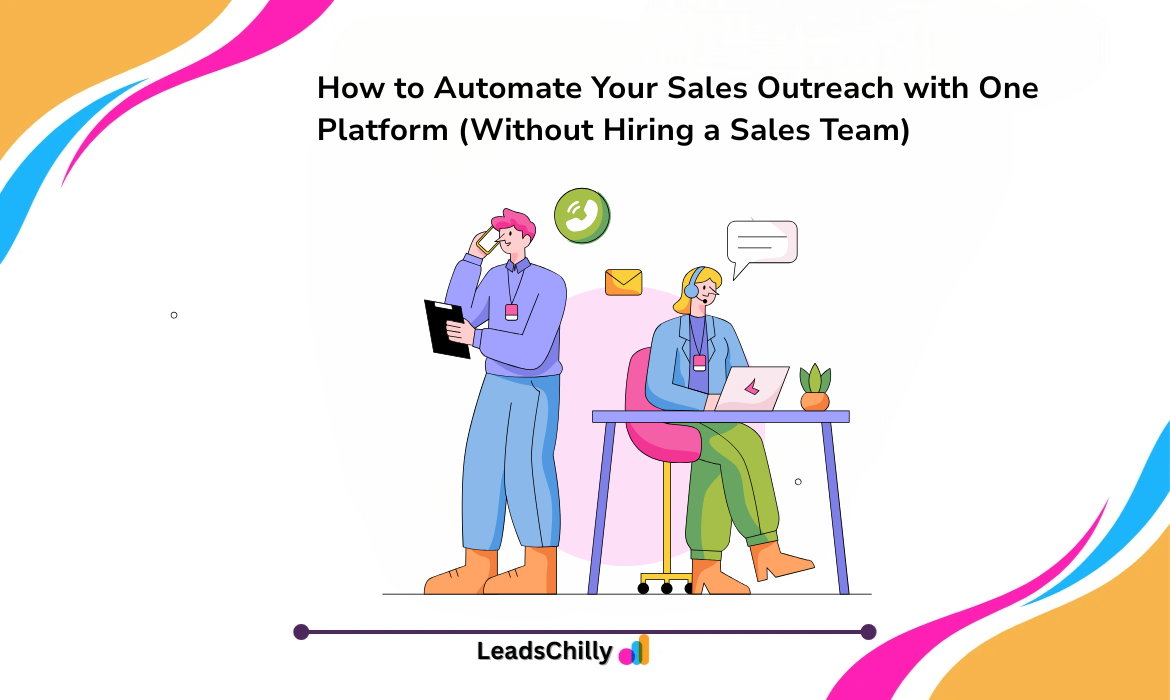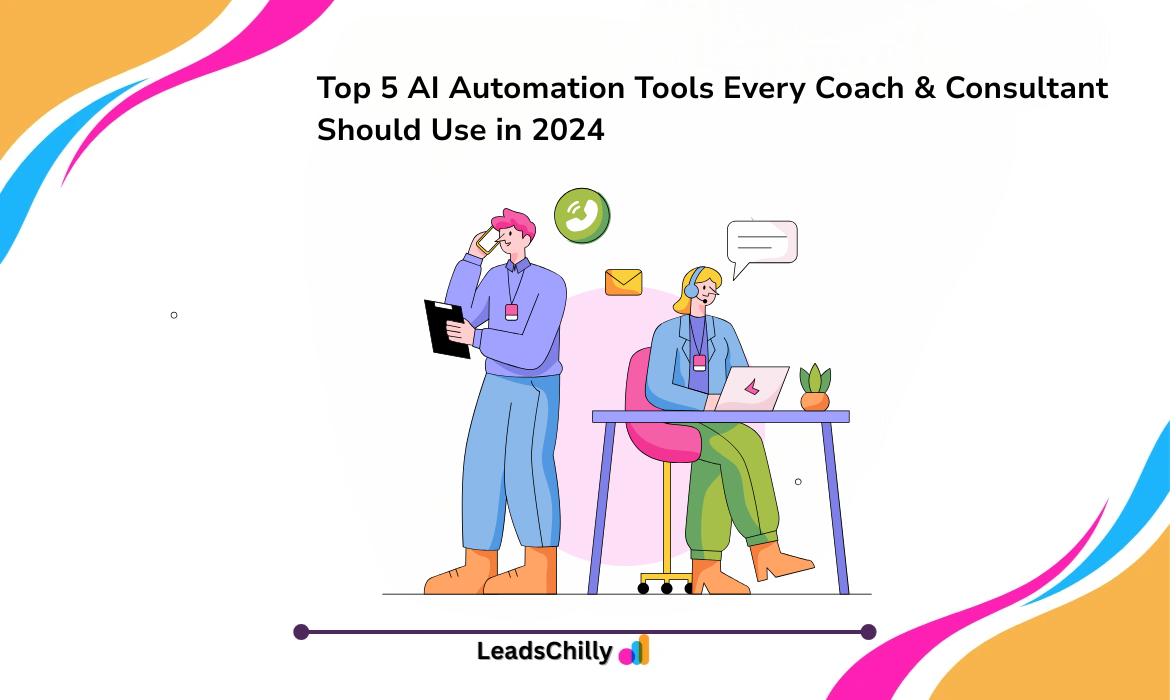In the fast-paced world of small business, efficiency is key to staying competitive. Marketing automation ideas offers an invaluable way to streamline your marketing efforts, save time, and improve customer engagement. Whether you’re just starting or looking to optimize your current strategy, LeadsChilly is here to help with a 14-day free trial that allows you to explore powerful automation tools designed specifically for small businesses.
By automating repetitive tasks, you can focus on what truly matters—growing your business. Between 2021 and 2024, worldwide marketing automation industry revenue is forecasted to grow by 38.2% to $6.62 billion – Statista
In this comprehensive guide, we’ll explore various marketing automation ideas tailored specifically for small businesses, ensuring you make the most of your resources.
Why Use Marketing Automation?
Marketing automation isn’t just a buzzword; it’s a practical tool that small businesses can use to achieve significant results. Whether you’re just starting out or looking to scale your operations, marketing automation can provide a substantial competitive advantage. Here’s why you should consider implementing it:
- Increased Efficiency: Time is one of the most valuable resources for any small business. Automating repetitive tasks like email marketing, social media posting, and lead nurturing allows your team to focus on more strategic activities.
For instance, rather than manually sending out emails every week, you can set up an automated campaign that targets your audience based on their behavior, ensuring timely and relevant communication. This not only saves time but also reduces the risk of human error, leading to more consistent and professional marketing efforts.
- Improved Customer Experience: Today’s consumers expect personalized interactions with the brands they engage with. Marketing automation allows you to deliver tailored content based on a customer’s past interactions with your business.
For example, if a customer frequently visits your website but hasn’t made a purchase, you can automate a sequence of personalized emails that offer product recommendations or discounts. This level of personalization helps build stronger relationships with your customers, leading to increased loyalty and higher conversion rates.
- Scalable Growth: As your business grows, so do your marketing needs. Marketing automation provides the flexibility to scale your efforts without a proportional increase in workload. Whether you’re targeting hundreds or thousands of potential customers, automation ensures that your marketing efforts can grow alongside your business.
By automating key processes, you can handle a larger customer base and more complex marketing campaigns without overwhelming your team. Start a demo with LeadsChilly today to see how scalable automation can work for you.
- Data-Driven Decisions: One of the significant advantages of marketing automation is the ability to track and analyze the performance of your campaigns in real-time. Automated tools provide detailed insights into how your audience is interacting with your content, allowing you to make data-driven decisions that optimize your marketing efforts.
For instance, if you notice that certain emails have higher open rates, you can replicate those strategies across other campaigns. This continuous feedback loop enables you to refine your approach and maximize ROI.
- Cost-effective: For small businesses, every dollar counts. Marketing automation can be a cost-effective solution to maximizing your marketing budget. By automating tasks that would otherwise require additional manpower, you reduce the need for hiring extra staff or outsourcing services.
Additionally, many marketing automation tools offer scalable pricing plans, allowing you to choose the features that best suit your current needs and budget.
By automating the routine tasks that can bog down your team, you can focus on the strategic initiatives that drive your business forward.
Login to LeadsChilly to explore how automation can enhance your marketing strategy today.
How Marketing Automation Examples Can Elevate Your Business
- Examples of Marketing Automation Ideas Marketing automation is about using technology to manage marketing tasks. For example, you can set up emails to send automatically when someone signs up on your website. You can also schedule social media posts to go live at certain times without needing to do it yourself.
- Examples of Marketing Automation Campaigns Some businesses create campaigns that automatically send targeted messages to customers. For example, an online store might send a discount code to customers who haven’t made a purchase in a while. Another example is sending a thank-you email after someone buys a product.
- Use Cases for Marketing Automation Marketing automation can be used in many different ways. Retail stores use it to remind customers of items left in their online shopping carts. Service companies might use it to send appointment reminders. No matter the industry, marketing automation can help businesses connect with customers more effectively.
Top Marketing Automation Ideas for Small Businesses
1. Automated Email Campaigns
Email marketing remains one of the most effective marketing channels for small businesses. By automating your email campaigns, you can maintain consistent communication with your audience without the manual effort.
- Welcome Emails: Set up an automated welcome email that is sent to new subscribers as soon as they sign up. This creates a positive first impression and introduces them to your brand.
- Drip Campaigns: Use drip campaigns to nurture leads through a series of automated emails that guide them through the buyer’s journey.
- Abandoned Cart Emails: Remind customers who have left items in their shopping cart without checking out. Automated cart abandonment emails can help recover lost sales. Sign up with LeadsChilly to start automating your email campaigns with ease.
2. Social Media Automation
Managing multiple social media accounts can be overwhelming. Social media automation tools allow you to schedule posts, monitor engagement, and even respond to messages automatically.
- Content Scheduling: Use tools like Buffer or Hootsuite to schedule your posts in advance, ensuring a consistent presence on all your social media platforms.
- Automated Responses: Set up chatbots on platforms like Facebook Messenger to handle common inquiries and customer service issues, freeing up your team to focus on more complex tasks. Start your journey towards more efficient social media management with a 14-day free trial from LeadsChilly.
3. Lead Scoring and Segmentation
Not all leads are created equal. By using lead scoring and segmentation, you can prioritize leads based on their likelihood to convert and tailor your marketing efforts accordingly.
- Lead Scoring: Assign points to leads based on their interactions with your brand, such as email opens, website visits, and form submissions. This allows your sales team to focus on the most promising prospects.
- Segmentation: Automatically segment your audience based on their behavior, interests, and demographics. This enables you to deliver more personalized and relevant marketing messages. Sign up today with LeadsChilly to take your lead scoring to the next level.
4. CRM Integration
Integrating Customer Relationship Management (CRM) with your marketing automation platform allows you to manage customer interactions more effectively and gain deeper insights into your audience.
- Automated Data Entry: Save time and reduce errors by automating the process of entering customer data into your CRM system.
- Personalized Customer Journeys: Use CRM data to create highly personalized marketing campaigns that resonate with your audience on a deeper level. Start a demo with LeadsChilly and see how CRM integration can transform your marketing strategy.
What Are Marketing Automation Tools?
Choosing the right marketing automation tools is crucial for the success of your efforts. Here are some popular options that are particularly well-suited for small businesses:
Mailchimp: A versatile tool that offers everything from email marketing automation to audience segmentation and analytics.
HubSpot: A comprehensive platform that combines marketing automation with CRM, sales, and customer service tools.
ActiveCampaign: Known for its powerful automation capabilities, ActiveCampaign is ideal for businesses that want to combine email marketing with CRM and sales automation.
LeadsChilly: LeadsChilly offers a robust set of marketing automation tools designed to streamline your processes, enhance lead generation, and drive conversions, making it a perfect fit for small businesses.
Login to LeadsChilly to explore a range of tools that can help you achieve your marketing goals.
How to Start Marketing Automation in Your Small Business
Assess Your Needs
Before diving into marketing automation, it’s important to assess which tasks are taking up the most time and could benefit from automation. Common areas include email marketing, social media management, and lead nurturing.
Choose the Right Tools
Selecting the right marketing automation tools for your business depends on your goals, budget, and technical expertise. Start with tools that offer a balance between functionality and ease of use.
Set Up Automation Workflows
Once you’ve chosen your tools, it’s time to set up automation workflows. These are the processes that will automatically carry out your marketing tasks based on predefined triggers and actions.
- Example Workflow: Set up an email sequence that automatically sends follow-up messages to leads who download a free resource from your website.
Monitor and Optimize
Marketing automation is not a set-it-and-forget-it strategy. Regularly monitor your automation workflows to ensure they are achieving the desired results. Use analytics to identify areas for improvement and make adjustments as needed. Ready to get started? Start your demo with LeadsChilly today and see how automation can optimize your marketing efforts.
What Are the Types of Marketing Automation?
Marketing automation encompasses a wide range of tools and strategies. Here are some of the most common types:
- Email Automation: Automating your email campaigns to ensure timely and relevant communication with your audience.
- Social Media Automation: Scheduling posts and automating interactions on social media platforms.
- CRM Integration: Automating the management of customer data and interactions.
- Lead Nurturing: Automatically guiding leads through the sales funnel with targeted content.
Conclusion
Implementing marketing automation ideas in your small business is a strategic move that can lead to increased efficiency, better customer engagement, and scalable growth. By leveraging the right tools and strategies, you can save time, reduce costs, and drive more revenue. Whether you’re new to automation or looking to expand your efforts, the ideas and strategies outlined in this guide will help you get started.
Remember, the key to successful marketing automation is continuous optimization. Start small, track your results, and scale your efforts as your business grows.
Ready to take your business to the next level? Start your demo with LeadsChilly and explore the possibilities of automation today.
Frequently Asked Questions
Q1. What Are Marketing Automation Tools?
Marketing automation tools are software platforms designed to help businesses automate their marketing efforts, such as email campaigns, social media posts, and lead management.
Q2. How Do You Create Marketing Automation?
To create marketing automation, start by identifying repetitive tasks that can be automated, suchas email marketing or lead nurturing. Then, choose the right tools and set up workflows that trigger actions based on user behavior.
Q3. What Is the Best Marketing Automation Tool?
The best marketing automation tool depends on your specific needs. Popular options include Mailchimp, HubSpot, and ActiveCampaign, all of which offer comprehensive features tailored to small businesses.
Q4. Why Use Marketing Automation?
Marketing automation saves time, improves customer engagement, and scales your marketing efforts. It allows small businesses to compete more effectively by automating repetitive tasks.
Q5. How Can I Automate My Marketing?
You can automate your marketing by using tools that handle email campaigns, social media posts, and lead management. Start by assessing your needs, choosing the right tools, and setting up workflows. Sign up for LeadsChilly’s 14-day free trial to start automating your marketing today.




Comments are closed.